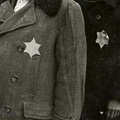Adatok
LuxAeterna
0 bejegyzést írt és 15 hozzászólása volt az általa látogatott blogokban.

Nyúljunk forró témához. A legforróbbhoz.
Kényelmesebb lenne persze hallgatni, tudván, hogy egy ilyen témában balról meg jobbról is súlyozni, centizni, méricskélni, mondatonként, szavanként elemezni szokták az egyszeri véleménynyilvánítót, de mit lehet tenni. Beszélni, írni,…..
LuxAeterna
2014.02.07 19:39:00
@tesz-vesz: meg a második generációs meg a harmadik generációs meg az ezredik generációs holokamutúlélők kárpótlása.

Az állam, ez az örök Leviathán többször is lecsapott saját védtelen áldozataira Európa innenső fertályában a huszadik században, annak középső évtizedeiben. A történelemkönyvek lapjairól, regényekből, fényképekről és tévéfelvételekről ismert sötét korszakról nem…..
LuxAeterna
2014.02.04 11:56:43
@♔batyu♔:
Örülnék ha mondanál a MAI közéletből egyetlen egy élő magyar zsidót, aki a nemzeti (tehát: nem liberális, mint a zsidesz) érdeket védi.
Köszi, előre is.
Örülnék ha mondanál a MAI közéletből egyetlen egy élő magyar zsidót, aki a nemzeti (tehát: nem liberális, mint a zsidesz) érdeket védi.
Köszi, előre is.
LuxAeterna
2014.02.04 13:10:27
@mavo: Jogosan fevethető hogy a háború után a SZU és a SZER, valamint a koalíciós kommunisták nyomást gyakoroltak a kormányra. Lehet hogy e ráhatások nélkül a kitelepítés nem töténik meg. Csak a teljesség kedvéért.
Ja, még egy: "fél mondatban megemlítettem, hogy egyébként apukám is eléggé antiszemita volt"
messze hullott a férges alma....
@♔batyu♔: Figyel, én a közéletben tésztvevő kajmánokra gondoltam, nem arra aki klozetban bevallja hogy hát a magyarok is rendesek meg izé, de nyilvánosság előtt nem vállalja fel.
Nyilván nincs ilyen, mert a zsidó egy kannibál-mentalitású törzsember, összetartanak erősen.
@I_Isti: A zsidó nem magyar. Pont. A zsidó zsidó.
Majd amikor kiadják Judenverordnungot, te is megérted. De akkor már késő lesz.
de.wikipedia.org/wiki/Verordnung_zur_Ausschaltung_der_Juden_aus_dem_deutschen_Wirtschaftsleben
itt is elkel egy jó kis "kikapcsolás", úgy tűnik
Ja, még egy: "fél mondatban megemlítettem, hogy egyébként apukám is eléggé antiszemita volt"
messze hullott a férges alma....
@♔batyu♔: Figyel, én a közéletben tésztvevő kajmánokra gondoltam, nem arra aki klozetban bevallja hogy hát a magyarok is rendesek meg izé, de nyilvánosság előtt nem vállalja fel.
Nyilván nincs ilyen, mert a zsidó egy kannibál-mentalitású törzsember, összetartanak erősen.
@I_Isti: A zsidó nem magyar. Pont. A zsidó zsidó.
Majd amikor kiadják Judenverordnungot, te is megérted. De akkor már késő lesz.
de.wikipedia.org/wiki/Verordnung_zur_Ausschaltung_der_Juden_aus_dem_deutschen_Wirtschaftsleben
itt is elkel egy jó kis "kikapcsolás", úgy tűnik
LuxAeterna
2014.02.04 13:45:46
@mavo: Dálnoki kiugrott a szovjeteknek, mondhatjuk volt benne egyfajta megfelelési kényszer, később is.
egyébként
en.wikipedia.org/wiki/Expulsion_of_Germans_after_World_War_II#Hungary
In contrast to the expulsions from other states, the expulsion of the Germans from Hungary was dictated from outside the nation,[70] and began on 22 December 1944 when the Soviet Commander-in-Chief ordered the expulsions. Three percent of the German pre-war population (about 20,000 people) had been evacuated by the Volksbund before that. They went to Austria, but many of them returned home in the spring. Overall, some 60,000 ethnic Germans had fled.[39] According to the West German Schieder commission report of 1956, in the spring of 1945, between 30–35,000 ethnic German civilians and 30,000 military POW were arrested and transported from Hungary to the Soviet Union as forced laborers. In some villages, the entire adult population were taken to labor camps in the Donets Basin. 6,000 died there as a result of hardships and ill-treatment.[71] Data from the Russian archives which was based on an actual enumeration, put the number of ethnic Germans registered by the Soviets in Hungary at 50,292 civilians of whom 31,920 were deported to the USSR for reparations labor and that 9% (2,819) died[72] Balázs Apor has put the overall figure at between 100,000 and 170,000 Hungarian ethnic Germans as being transported to the Soviet Union.[73]
In 1945, official Hungarian figures showed 477,000 German speakers in Hungary, including a remarkable number of Jews of German mother tongue, 303,000 of whom had declared German nationality.[73] Of the German nationals, 33% were children younger than 12 or elderly people over 60; another 51% were women.[73]
Tehát:1) a szovjet katonai parancsnokság adta ki ELŐSZÖR parancsba hogy a németeket el kell távolítani, a kormány csak csicskamódra végrehajtotta később, Potsdam után, 2) rengeteg zsidó németnek vallotta magát.
folytatás
On 29 December 1945, the postwar Hungarian Government, obeying the directions of the Potsdam Conference agreements, ordered the expulsion of everyone who had declared themselves German in the 1941 census, or had been a member of the Volksbund, the SS, or any other armed German organisation. Accordingly, mass expulsions began.[39] The rural population was affected more than the urban population or those ethnic Germans with needed skills, such as miners.[74][75] Germans married to Hungarians were not expelled, regardless of sex.[68] The first 5,788 expellees left from Budaörs (Wudersch) on 19 January 1946.[74] About 180,000 German-speaking Hungarian citizens were deprived of their citizenship and all possessions, and expelled to the Western zones of Germany.[76] Up to July 1948, a further 35,000 people were expelled to the Eastern zone of Germany.[76] Most of the expellees found new homes in the Southwest German province of Baden-Württemberg,[77] but many also in Bavaria and Hesse. Other research indicates that, between 1945 and 1950, 150,000 were expelled to western Germany, 103,000 to Austria, and none to eastern Germany.[67] During the expulsions, numerous organized protest demonstrations by the Hungarian population took place.[78]
Vagyis: a tömeges kitelepítések Potsdam UTÁN, azt KÖVETVE következtek el.
egyébként
en.wikipedia.org/wiki/Expulsion_of_Germans_after_World_War_II#Hungary
In contrast to the expulsions from other states, the expulsion of the Germans from Hungary was dictated from outside the nation,[70] and began on 22 December 1944 when the Soviet Commander-in-Chief ordered the expulsions. Three percent of the German pre-war population (about 20,000 people) had been evacuated by the Volksbund before that. They went to Austria, but many of them returned home in the spring. Overall, some 60,000 ethnic Germans had fled.[39] According to the West German Schieder commission report of 1956, in the spring of 1945, between 30–35,000 ethnic German civilians and 30,000 military POW were arrested and transported from Hungary to the Soviet Union as forced laborers. In some villages, the entire adult population were taken to labor camps in the Donets Basin. 6,000 died there as a result of hardships and ill-treatment.[71] Data from the Russian archives which was based on an actual enumeration, put the number of ethnic Germans registered by the Soviets in Hungary at 50,292 civilians of whom 31,920 were deported to the USSR for reparations labor and that 9% (2,819) died[72] Balázs Apor has put the overall figure at between 100,000 and 170,000 Hungarian ethnic Germans as being transported to the Soviet Union.[73]
In 1945, official Hungarian figures showed 477,000 German speakers in Hungary, including a remarkable number of Jews of German mother tongue, 303,000 of whom had declared German nationality.[73] Of the German nationals, 33% were children younger than 12 or elderly people over 60; another 51% were women.[73]
Tehát:1) a szovjet katonai parancsnokság adta ki ELŐSZÖR parancsba hogy a németeket el kell távolítani, a kormány csak csicskamódra végrehajtotta később, Potsdam után, 2) rengeteg zsidó németnek vallotta magát.
folytatás
On 29 December 1945, the postwar Hungarian Government, obeying the directions of the Potsdam Conference agreements, ordered the expulsion of everyone who had declared themselves German in the 1941 census, or had been a member of the Volksbund, the SS, or any other armed German organisation. Accordingly, mass expulsions began.[39] The rural population was affected more than the urban population or those ethnic Germans with needed skills, such as miners.[74][75] Germans married to Hungarians were not expelled, regardless of sex.[68] The first 5,788 expellees left from Budaörs (Wudersch) on 19 January 1946.[74] About 180,000 German-speaking Hungarian citizens were deprived of their citizenship and all possessions, and expelled to the Western zones of Germany.[76] Up to July 1948, a further 35,000 people were expelled to the Eastern zone of Germany.[76] Most of the expellees found new homes in the Southwest German province of Baden-Württemberg,[77] but many also in Bavaria and Hesse. Other research indicates that, between 1945 and 1950, 150,000 were expelled to western Germany, 103,000 to Austria, and none to eastern Germany.[67] During the expulsions, numerous organized protest demonstrations by the Hungarian population took place.[78]
Vagyis: a tömeges kitelepítések Potsdam UTÁN, azt KÖVETVE következtek el.
Belépve többet láthatsz. Itt beléphetsz
